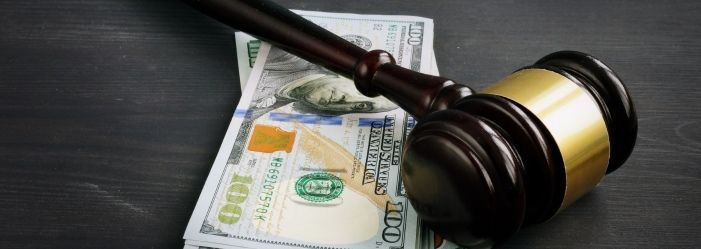Last Updated: December 06, 2023
Things Happen If You Don't Pay Student Loan

If you're a student and you don't pay your student loans back, the consequences can be severe. You may have to deal with a wage garnishment, seizure of personal assets, and other legal action that will make it difficult or impossible for you to get credit again.
It's important to understand the financial risks before deciding whether or not you want to repay your loan. In this article, we'll go over what will happen to you if you stop paying your student loans.
What happens if I don't pay my student loans?
If you don't pay your student loans, they will go into default and you will have to repay them under the terms of "income-driven repayment." Income-driven repayment means forgoing some good options today in order to pay off a financial obligation sooner.
For instance, if today you are eligible for income-based repayment and interest has been capitalized at least one time after the initial delinquency, your payments may be as low as $0 per month.
You are also entitled to a grace period, which is six months after the day you leave school. After that time has passed and if you still do not make any payments on your loan, it will go into default status.
What are the consequences of not paying your student loans?
There are some serious ramifications if you decide not to pay this loan off like when they charge high interest rates or make it more difficult for anyone who's trying to get out from under their debts quickly.
You may end up in a lot of debt with your student loans. If you don't pay on time, then the interest rates will be higher and it'll take you longer to reach that "debt-free" goal.
If you default on a student loan, the government can garnish your wages and seize tax refunds. In some cases, they may take away your social security benefits or even suspend your driver's license.
Your credit score will drop
If you default on a student loan, your credit score will lower significantly.
If you're not making payments on your student loan debt and have missed at least one payment in the last six months, your lender may report this delinquency to one of the three major credit bureaus: Experian, Equifax or TransUnion.
This will result in a negative entry on your credit report that could weigh down your FICO (a widely used measure for evaluating consumer risk) scores by as much as 100 points!
Why you should worry about having a low credit score
You may end up being unable to get loans for things like cars or houses. It also puts strain on future relationships because people with bad credit can be seen as unreliable and untrustworthy. A low credit score is usually associated with higher rates of interest on loans.
Furthermore, if you're thinking about starting or running a business and have no personal investing history then obtaining an entrepreneur's loan becomes much more difficult with few sources for funding available.
So what does this all mean? If you have a low credit score it means that not only will it be more difficult for you to acquire loans.
You'll owe more interest
Some people don't have the money to pay back their student loan when they graduate. They might not be able to get a job that pays enough, or simply can't find any work at all.
If you default on your loans, it could cost you more down the road as well: in addition to accumulating interest and penalties. It depends if the loans are being subsidized or not. If it is, then you will be charged late fees and penalties for not paying on time.
There will also be interest charges added to your repayment amount because of the missed payments which will have to be accounted for when you refinance your student loan debt.
It could affect future employment opportunities
It may or may not affect your future employment, depending on the employer and position applied for. However, it could seriously affect your credit score and how a bank looks at you for any future loans.
Student loan debt is a form of consumer debt like credit card debt. Like with credit card debt, missing payments on student loans can have serious consequences for someone trying to buy property or apply for financing later in life.
That being said, missing payments on one's car loan has little effect on one's ability to go get an apartment. The same goes for student loans; missing payments will incur stiff penalties typical of late fees and interest rate hikes but otherwise should not be detrimental to long term prospects.
Click here to learn more about how to get a loan with no credit history
What You Should Do To Get Rid of Student Loans
Student loans can be extremely difficult or even impossible to get rid of, but bankruptcy is an option. The best time to file for bankruptcy would have been within three years of when your student loan went into delinquency. Either filing Chapter 7 (total discharge) or Chapter 13 (regular repayment).
If you are beyond that timeframe, all is not lost as there are still options available to help with the crippling debt load from student loans. This includes refinancing and consolidating private and federal loans, as well as other options like working through student loan forgiveness programs if eligible.
Click here to find out more information about Bankruptcy
Saving for retirement is another way to remove your student loan burden. Let's say that a family makes enough money to spend $50,000 every year. In this scenario, if you’d put 10% of your income into a 401(k) account and saved 15% in total (by taking out taxes on various investments), at age 67 you could have saved up $1 million.
Loans from parents or a government would still need to be paid off, but with this type of savings plan even borrowing more debt to defer taxes will be considered manageable.
Of course, saving any amount of money helps the long-term! Frugal living does wonders for getting rid of student loans because it generates extra income.
Repayment Plan Options
The federal government offers several income-driven repayment (IDR) plans that base your monthly student loan payment on your discretionary income and family size. These plans can provide more affordable payments compared to the standard 10-year repayment plan.
Options include:
- REPAY: Payment is 10% of discretionary income. Unpaid interest does not get added to loan balance. Forgiveness after 20 years (undergraduate loans) or 25 years (graduate loans).
- PAY: Payment is 10% of discretionary income. Unpaid interest does not get added to loan balance. Forgiveness after 20 years.
- SAVE: Newest option with improved terms. Payment is just 5% of discretionary income. Unpaid interest does not get added to loan balance. Forgiveness after 10 years for loans less than $12,000 or 20 years for larger balances.
Be sure to recertify your income annually for these plans. If you lose eligibility, your payment could increase significantly. Learn more at StudentAid.gov.
Impacts on Your Credit Score
Missing student loan payments can seriously hurt your credit. As soon as one payment is 90 days late, your loan becomes delinquent and this negative status gets reported to the three main credit bureaus.
Scores can drop by 100 points or more. Poor credit makes it much harder to qualify for loans, credit cards, and other financing on reasonable terms. Interest rates are usually much higher as well.
For example, a borrower with a 760 score saw it drop to 670 after becoming 90 days delinquent on a student loan. The higher interest rates and denial of future credit make paying off debt even more challenging.
Getting Out of Default
If your federal student loan lapses 270 days without payment, it enters default status. At this point the entire unpaid balance becomes due immediately.
There are several options to resolve this:
- Loan Rehabilitation: Make 9 on-time payments over 10 months and your loan exits default. Collection fees may be waived and the default removed from your credit history.
- Loan Consolidation: Combine defaulted loans into a Direct Consolidation Loan with up to 30 years for repayment and to regain eligibility for deferments, etc.
- Settlements: The lender agrees to let you pay a lump sum that is less than the amount owed to consider the debt resolved. However, the unpaid balance may still be subject to taxes.
Contact your loan servicer as soon as possible if you default on federal student loans to discuss these and other options. Private student loans have fewer options once in default - usually requiring either full repayment or legal action.
FAQs
Conclusion
Student loans are a heavy burden for many people. If you're one of the millions who has yet to start paying your student loans off, it's important that you know what could happen if you don't pay them back. You may end up in default and have to deal with wage garnishment or other consequences like not being able to get a passport until they're paid off.
It can be tempting to ignore these payments, but do so at your own peril because there is no time limit on when lenders will come after borrowers for payment--it might only take six months before you find yourself facing serious financial penalties. The last thing anyone wants is an unpaid loan haunting them throughout their life.
Speak to one of our
debt specialists today so they can explain your options.
✔ Accredited by Better Business Bureau with BBB A+ rating (4.93 rating and 1678 reviews)
✔ US News and World Reports and Bankrate ranked Pacific Debt Relief as one of “The Best Debt Relief Companies of 2024”
✔ 6.9 star rating by BestCompany.com (over 2379 client reviews)
✔ 4.8 star rating by TrustPilot based (over 1613 verified consumer reviews)
✔ ConsumerAffairs.com Accredited (over 544 verified reviews with an average rating of 5 stars)
✔ A Top 10 Rated Compan by TopTenReviews.com , ConsumersAdvocate.com and Top10debtconsolidation.com
✔ 4.6 star rating by Google (229 client reviews)
✔ 100% rating by SuperMoney (9 client reviews)
Reduce Your Credit Card Debt By Up to Half

BBB Reviews | 4.9/5.0 Rating









 Do Not Sell My Personal Information
Do Not Sell My Personal Information